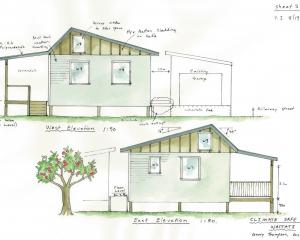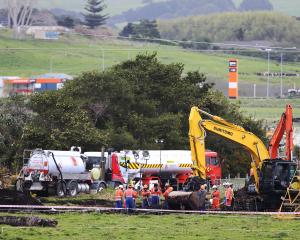

I'm writing from Wellington as I attend the Eco Design Advisors annual conference, which this year took the theme "guaranteeing healthy homes".
To get from my accommodation (I am staying with family in Lower Hutt) I have been able to get a train and bus and walk to the venue in the morning, and return "home" in the evening by catching a bus with a short walk at the end. It is such a pleasure not to have to drive.
All of this communal transport was very fitting for day one, when the conference was opened by Phil Twyford, who is not only Minister for Housing and Urban Development but transport as well. The Minister strongly asserted the critical role of central government in providing safe and healthy housing and confirmed plans for an urban development authority. In addition, he spoke of the standards that are being developed now for the Healthy Homes Guarantee Act, which was adopted by the incoming Government in December last year. The Act is intended to address the shameful statistic that 1600 elderly people die prematurely each year because of poor quality housing.
Economist Rod Oram also spoke and made the point that 2007 was the first year that more than half the world's population could be said to live in cities. He asked how is it that we know so much about how to live sustainably but we do so little? And how can we galvanise action, with the collective knowledge at our disposal? The issues of climate change are global, but solutions are increasingly local and this is important, Oram said, because working at a local level we can achieve an unprecedented speed, scale and complexity of change, as long as we are not afraid to learn as we go.
Some of the rest of the programme dealt with the rental housing sector, housing and health, and "large scale interventions", and that was just day one of two.
The conference followed swiftly, for me at least, on the heels of a workshop run by Blueskin Resilient Communities Trust, the organisation for which I work, in South Dunedin on climate change adaptation. One of the strongest sentiments expressed at the workshop ("Our City, Our Climate") was a sense of community and respect for community values.
Much of the workshop was about bringing the Dunedin community together with climate and policy experts to explore the key issues that will need to be addressed if Dunedin is to develop effective policies and actions as we adapt to our changing world. It involved receiving up to date expert information, mapping the issues and exploring those issues we face. We want, via these and future workshops, to begin preparing for change and to avoid locking in investments that could make adjustments more difficult.
A planning approach recommended to local government by the Ministry for the Environment, known as Dynamic Adaptive Pathways Planning, is a way of dealing with uncertainty and risk with community participation at its heart. It gives voice to ordinary people and helps us make decisions even while faced with uncertainty. This is the work we have been doing at our climate adaptation workshops and it needs to continue. While 30cm to 40cm of sea-level rise is virtually certain by mid-century, we don't yet know if by 2100 sea-level will rise by one or two metres or some number in between. What we do know is that sea-level rise is under way and will continue for centuries. And that presents both uncertainties and challenges: how to plan even while we have uncertainty about the extent of future coastal hazards.
This all brings me back to Rod Oram's call for local action. I firmly believe we, as a city, can develop a commitment to a city-wide focus on collective action as we adapt to climate change impacts.
Collaboration is the key and through three Our City, Our Climate workshops we have been supported by the Deep South Science Challenge, the Dunedin City Council and the Otago Polytechnic, as well as community support from Wise Response, Our Climate Declaration, Forest and Bird, Sustainable Dunedin City, Generation Zero, Seniors Climate Action Network and the St Clair Action Group.
Phil Twyford says an Urban Development Authority is to be developed this year and with about 4000 houses in Dunedin at risk of increasingly regular inundation (with some 12,000 people affected), we are well placed to launch a bid for central government support.
Think about this as you make your submissions on the Dunedin City Council's Long Term Plan. Imagine a compact, carbon neutral, sustainable city with resilient townships. We will need policies that can adapt and change as we gain knowledge and experience. We will need to be accommodating and learn from our mistakes. And we will need to take a risk-based approach for "hazard assessments, risk/vulnerability assessments, and comprehensive adaptation plans".
One thing is clear. No one organisation can deal with this alone. Our response as a city will require residents to step up, local government to partner, and central government to help. But we can do this, and why not build a better world with warm and healthy housing and good public transport while we're about it? We can work together for community well-being in our changing climate through a large scale, community-led approach. Wouldn't that be cool to be involved in?
Scott Willis is the project manager of Blueskin Energy Ltd. Each week in this column, one of a panel of writers addresses issues of sustainability.
Make a submission on the DCC's Long Term Plan
- It can be as short as a sentence or as long as a short story.
- Perhaps suggest using a Dynamic Adaptive Pathway Planning approach to evaluate all decisions.
- This would be a good time to call for a collective approach to climate change adaptation.
- Visit, www.dunedin.govt.nz/your-council/10-year-plan












